Thousands of people yesterday rallied outside the Legislative Yuan in Taipei, demanding that the Hong Kong government withdraw its controversial extradition bill and release protesters arrested in connection with demonstrations in the territory last week.
The rally organized by Hong Kong students, the Taiwan Citizen Front and the Taiwan Youth Association for Democracy (TYAD), drew more than 10,000 people despite scorching heat, organizers said.
Although Hong Kong Chief Executive Carrie Lam (林鄭月娥) on Saturday said that the reviews of the bill in Hong Kong’s Legislative Council would be suspended, it was not withdrawn, said TYAD member Michelle Wu (吳奕柔), who is also president of the National Taiwan University Student Association.
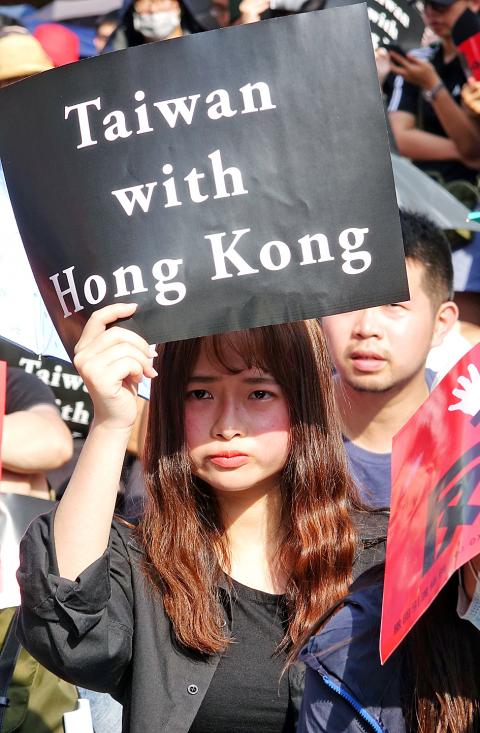
Photo: Fang Pin-chao, Taipei Times
If passed, the bill would allow anyone arrested in Hong Kong to be extradited to mainland China for trial, subjecting them to that nation’s notoriously opaque judicial system, she said.
“We urge Carrie Lam to immediately promise to withdraw the bill, take responsibility for the violent crackdowns that escalated clashes between police and protesters, stop persecution of protesters, cease unwarranted searches and thoroughly investigate officers involved in police violence,” Wu said.
Hong Kong’s experience should serve as a warning for Taiwanese, proving that Beijing’s “one country, two systems” arrangement cannot be trusted, said Hong Kong Independence Union convener Wayne Chan (陳家駒), who was arrested in Hong Kong on Sunday last week for joining protests against the bill and released on bail the following day.
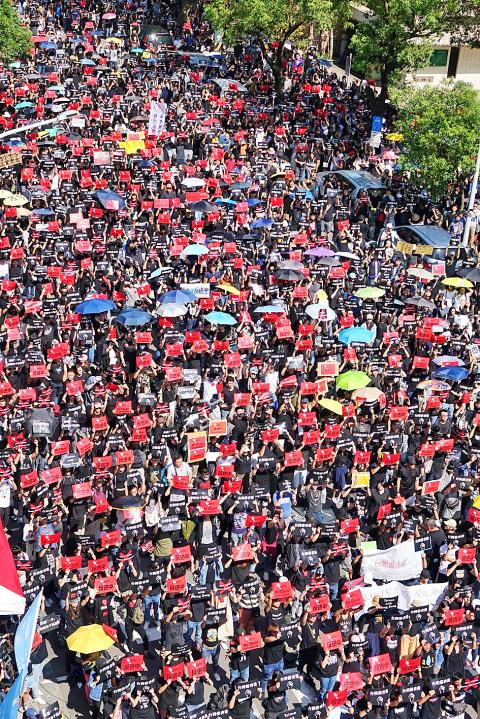
Photo: Liu Hsin-de, Taipei Times
He used to believe that the arrangement would protect Hong Kongers’ freedom, ensure democracy and the rule of the law in the territory, he said.
“However, today we cannot even speak out loud the truth we believe in, or express our expectations for Hong Kong’s future,” he said.
He will soon return to Hong Kong to face investigation from the authoritarian government, he said.
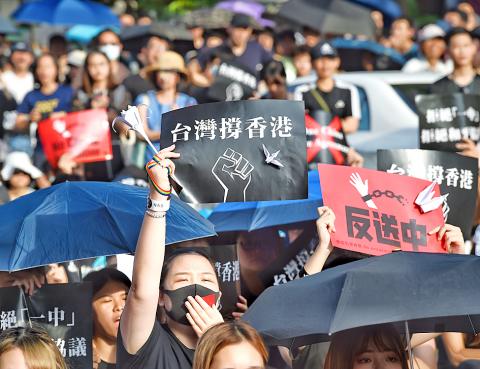
Photo: Fang Pin-chao, Taipei Times
“I do not know whether the government would again shoot and arrest people for going on strike, but we Hong Kongers will fight to the end no matter what,” he said.
Taiwan and Hong Kong must stand in solidarity in their fight against Beijing, both being victims of China’s imperialism, said Wu Ruei-ren (吳叡人), an associate research fellow at Academia Sinica Institute of Taiwan History.
China expands its authoritarianism by promoting the “one country, two systems” framework, which is in reality a form of imperialism and colonialism, he said, adding: “Hong Kong deserves a second chance to realize self-determination.”
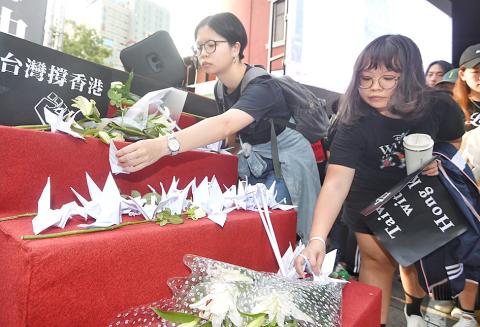
Photo: Fang Pin-chao, Taipei Times
The Taipei rally, which began at 2pm, lasted more than three hours before ending with people placing white flowers and paper cranes in front of a stage on Jinan Road to condemn police violence against the protesters in Hong Kong and offer condolences for a Hong Kong man who died on Saturday after falling from scaffolding in the Admiralty district after he hung a banner opposing the extradition bill.
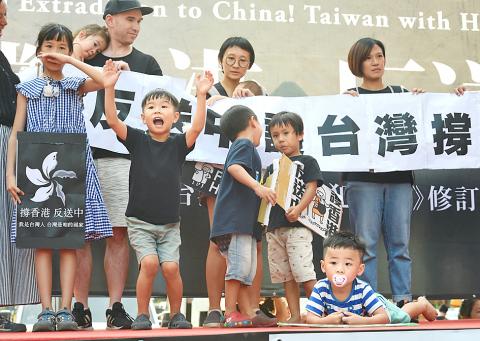
Photo: Fang Pin-chao, Taipei Times

The Ministry of Foreign Affairs (MOFA) yesterday said it is closely monitoring developments in Venezuela, and would continue to cooperate with democratic allies and work together for regional and global security, stability, and prosperity. The remarks came after the US on Saturday launched a series of airstrikes in Venezuela and kidnapped Venezuelan President Nicolas Maduro, who was later flown to New York along with his wife. The pair face US charges related to drug trafficking and alleged cooperation with gangs designated as terrorist organizations. Maduro has denied the allegations. The ministry said that it is closely monitoring the political and economic situation

UNRELENTING: China attempted cyberattacks on Taiwan’s critical infrastructure 2.63 million times per day last year, up from 1.23 million in 2023, the NSB said China’s cyberarmy has long engaged in cyberattacks against Taiwan’s critical infrastructure, employing diverse and evolving tactics, the National Security Bureau (NSB) said yesterday, adding that cyberattacks on critical energy infrastructure last year increased 10-fold compared with the previous year. The NSB yesterday released a report titled Analysis on China’s Cyber Threats to Taiwan’s Critical Infrastructure in 2025, outlining the number of cyberattacks, major tactics and hacker groups. Taiwan’s national intelligence community identified a large number of cybersecurity incidents last year, the bureau said in a statement. China’s cyberarmy last year launched an average of 2.63 million intrusion attempts per day targeting Taiwan’s critical

‘SLICING METHOD’: In the event of a blockade, the China Coast Guard would intercept Taiwanese ships while its navy would seek to deter foreign intervention China’s military drills around Taiwan this week signaled potential strategies to cut the nation off from energy supplies and foreign military assistance, a US think tank report said. The Chinese People’s Liberation Army (PLA) conducted what it called “Justice Mission 2025” exercises from Monday to Tuesday in five maritime zones and airspace around Taiwan, calling them a warning to “Taiwanese independence” forces. In a report released on Wednesday, the Institute for the Study of War said the exercises effectively simulated blocking shipping routes to major port cities, including Kaohsiung, Keelung and Hualien. Taiwan would be highly vulnerable under such a blockade, because it

Conflict with Taiwan could leave China with “massive economic disruption, catastrophic military losses, significant social unrest, and devastating sanctions,” a US think tank said in a report released on Monday. The German Marshall Fund released a report titled If China Attacks Taiwan: The Consequences for China of “Minor Conflict” and “Major War” Scenarios. The report details the “massive” economic, military, social and international costs to China in the event of a minor conflict or major war with Taiwan, estimating that the Chinese People’s Liberation Army (PLA) could sustain losses of more than half of its active-duty ground forces, including 100,000 troops. Understanding Chinese